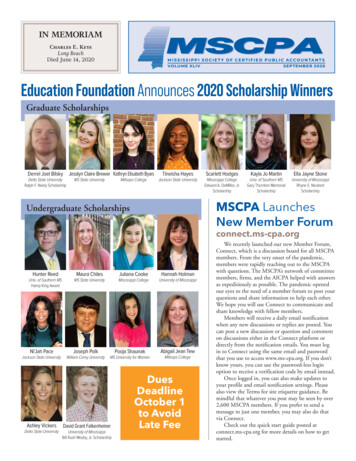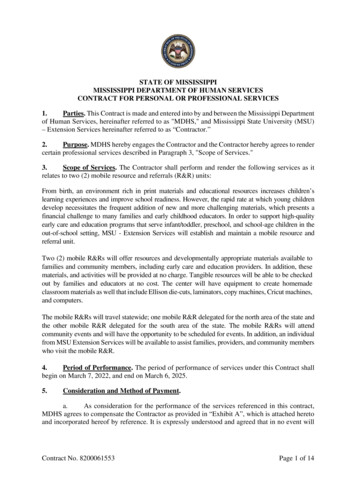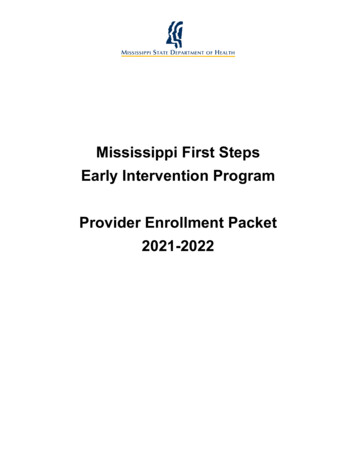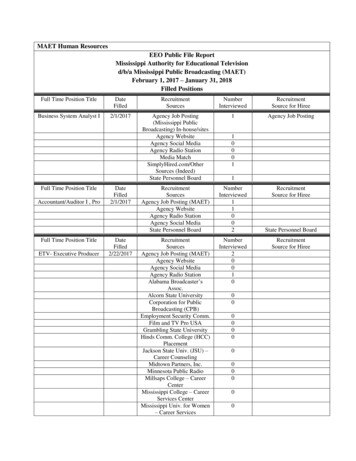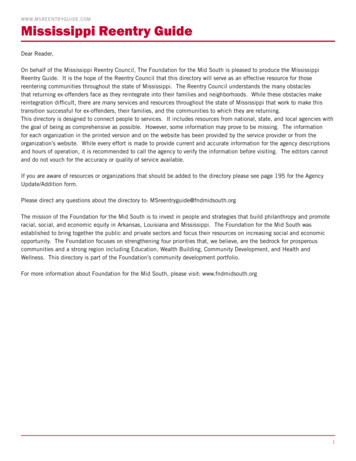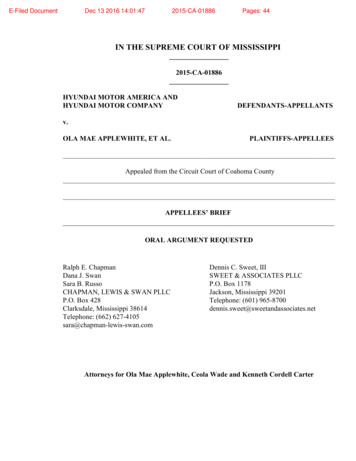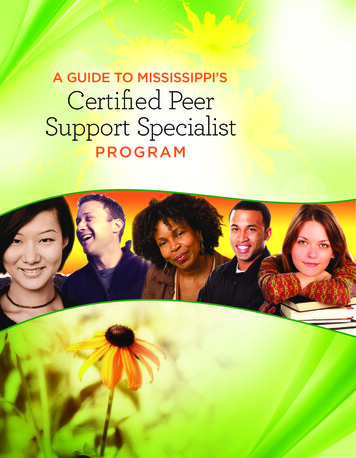
Transcription
A GUIDE TO MISSISSIPPI’SCertified PeerSupport SpecialistPROG RA M
Table of ContentsI.II.Introduction and BackgroundWhat is recovery?III. What are the components ofrecovery?IV. Who would benefit from utilizing thisguide?V. Who are Certified Peer SupportSpecialists and what do they do?VI. What does the research say aboutPeer Support Services?VII. Where can a Certified Peer SupportSpecialist be employed?VIII. What is the training to become aCertified Peer Support Specialist?IX. What are other considerations inbecoming a Certified Peer SupportSpecialist?X. What else has been said about PeerSupport?MPSSNMississippi Peer Support Specialist Network2
IntroductionCreating a Person-Centered and Recovery-Oriented System of Care is a priority of theMississippi Department of Mental Health (DMH). According to the Substance Abuse andMental Health Services Administration (SAMHSA), a Recovery-Oriented System of Care is acoordinated network of community-based services and supports that is person-centered andbuilds on the strengths and resilience of individuals, families, and communities to achievehealth, wellness, and quality of life for those with or at risk of behavioral health challenges.At the heart of a Person-Centered and Recovery-Oriented System of Care is the belief thatpeople with serious mental health issues and substance use disorders can and do recover,and that people in recovery can provide vital support to each other in achieving long-termrecovery. One major emphasis in DMH’s transformation efforts is the availability of CertifiedPeer Support Specialists (CPSS). DMH strongly believes in the contribution of familymembers and/or persons who have received or are currently receiving behavioral healthservices and values their lived experience.Background November 2011 - The Board of Mental Health approved the CPSS program credentialing. January 2012 - DMH held its first CPSS Training. January 2012 - Medicaid approved Peer Support as a billable service. J uly 2012 - Peer Support Services are added as a Core Service for Adult Mental HealthServices, Children & Youth Mental Health Services and Recovery Support Services forAlcohol and Drug Services.3
What is Recovery?To clearly define recovery, the Substance Abuse andMental Health Services Administration (SAMHSA), withinthe U.S. Department of Health and Human Services, andthe Interagency Committee on Disability Research, inpartnership with six other Federal agencies, convenedthe National Consensus Conference on Mental HealthRecovery and Mental Health Systems Transformation inDecember 2004.More than 110 expert panelists participated, includingindividuals living with mental health issues, familymembers, providers, advocates, researchers, academicians,managed care representatives, accreditation organizationrepresentatives, state and local public officials, andothers. A series of technical papers and reports werecommissioned that examined topics such as recoveryacross the lifespan, definitions of recovery, recovery incultural contexts, the intersection of mental health andaddictions recovery, and the application of recovery atindividual, family, community, provider, organizational,and systems levels.Recovery is a process of change through which individualsimprove their health and wellness, live a self-directed life,and strive to reach their full potential.I can participate“Recovery for me is thate everyone else.in the community just likto differentI can hold my job. I can goand interact withplaces in the communityI can maintainpeople and not be afraid.my family. CPSSgood relationships withre comfortabletraining helped me be mod me have aaround people and helperth. The trainingbetter feeling of self-wor able to speakalso helped me to be betteup when I need to.”David Connell,CPSS4
What are the components of recovery?SELF-DIRECTION: To the highest degree possible, individuals lead, control, exercise choice over,and determine their own path of recovery by optimizing autonomy, independence, and control ofresources to achieve a self-determined life. By definition, the recovery process must be self-directedby the individual, who defines his or her own life goals and designs a unique path towards thosegoals.INDIVIDUALIZED AND PERSON-CENTERED: There are multiple pathways to recovery basedon an individual’s unique strengths and resiliencies as well as his or her needs, preferences,experiences (including past trauma), and cultural background in all of its diverse representations.Individuals also identify recovery as being an ongoing journey and an end result as well as anoverall paradigm for achieving wellness and optimal mental health.EMPOWERMENT: Individuals have the authority to choose from a range of options and toparticipate in all decisions—including the allocation of resources—that will affect their lives andare educated and supported in so doing. They have the ability to join with others to collectivelyand effectively speak for themselves about their needs, wants, desires, and aspirations. Throughempowerment, an individual gains control of his or her own destiny and influences theorganizational and societal structures in his or her life.HOLISTIC: Recovery encompasses an individual’s whole life, including mind, body, spirit, andcommunity. Recovery embraces all aspects of life, including housing, employment, education,mental health and healthcare treatment and services, complementary and naturalistic services,addictions treatment, spirituality, creativity, social networks, community participation, and familysupports as determined by the person. Families, providers, organizations, systems, communities,and society play crucial roles in creating and maintaining meaningful opportunities for anindividual’s access to these supports.NON-LINEAR: Recovery is not a step-by-step process but one based on continual growth,occasional setbacks, and learning from experience. Recovery begins with an initial stage ofawareness in which a person recognizes that positive change is possible. This awareness enablesthe consumer to move on to fully engage in the work of recovery.STRENGTHS-BASED: Recovery focuses on valuing and building on the multiple capacities,resiliencies, talents, coping abilities, and inherent worth of individuals. By building on thesestrengths, consumers leave stymied life roles behind and engage in new life roles (e.g., partner,caregiver, friend, student, employee). The process of recovery moves forward through interactionwith others in supportive, trust-based relationships.PEER SUPPORT: Mutual support—including the sharing of experiential knowledge and skills andsocial learning—plays an invaluable role in recovery. Individuals in recovery encourage and engageothers in recovery and provide each other with a sense of belonging, supportive relationships,valued roles, and community.5
What are the components of recovery?RESPECT: Community, societal acceptance, and appreciation—including the protection of rightsand the elimination of discrimination and stigma—are crucial in achieving recovery. Self-acceptanceand regaining belief in one’s self are particularly vital. Respect ensures the inclusion and fullparticipation of individuals in all aspects of their lives.RESPONSIBILITY: Individuals have a personal responsibility for their own self-care and journeysof recovery. Taking steps towards their goals may require great courage. They must strive tounderstand and give meaning to their experiences and identify coping strategies and healingprocesses to promote their own wellness.HOPE: Recovery provides the essential and motivating message of a better future— that peoplecan and do overcome the barriers and obstacles that confront them. Hope is internalized; but canbe fostered by peers, families, friends, providers, and others. Hope is the catalyst of the recoveryprocess. Mental health recovery not only benefits individuals with mental health disabilities byfocusing on their abilities to live, work, learn, and fully participate in our society, but also enrichesthe texture of American community life. America reaps the benefits of the contributions individualswith mental disabilities can make, ultimately becoming a stronger and healthier Nation.RESILIENCY: (Source: President’s New Freedom Commission on Mental Health) The personal andcommunity qualities that enable us to rebound from adversity, trauma, tragedy, threats, or otherstresses - and to go on with life with a sense of mastery, competence, and hope.Who would benefit fromutilizing this guide?The Certified Peer Support Specialist Guide is designed to provide information about the CPSSProgram sponsored by the Mississippi Department of Mental Health (DMH). The informationcontained in this guide will be useful to individuals who would like to learn more about Peer SupportServices and who are considering becoming trained as a CPSS.“Being aCPa stronge SS has helped mer personbecomeand giveto help on me toother indivlsiduals inrecoverytheir ownjourney.It’s given mwhen befeore I wasin the sha a voicekept silendows andt. It has shofull of opportunity wn me that life isand I havnetworkse so mantoymyself bu help me help notonlyt others.”June Boudreaux, CPSSGulf Coast MentalHealth Center6
Who are Certified Peer SupportSpecialists and what do they do?Certified Peer Support Specialist (CPSS) is a title forindividuals who have progressed in their own recoveryfrom substance use or mental illness, are willing toself-identify as someone in need of behavioral healthservices, and to work to assist family members orothers also receiving those services. Family membersof individuals in recovery can also be Certified PeerSupport Specialists. Additionally, a CPSS mustsuccessfully complete formal training recognized bythe Mississippi Department of Mental Health (DMH)and be employed by a DMH Certified Provider.it and how. The “who” must be a person with livedexperience of mental illness and/or substance abuse.The “how” must be built on the values and principlesof peer support.Certified Peer Support Specialists are qualified tohelp others in many capacities. The exact roles,responsibilities and/or activities of a CPSS will bedetermined by the employer, and depend on the needsof the people being served and the lived experienceof the CPSS. It should be noted that Peer Supportinvolves face-to-face contact with one or moreindividuals. If a CPSS is assigned a task that does notinvolve working with individuals receiving servicesand/or family members, they are not providing peersupport.Because of his or her lived experience, a CPSS hasknowledge and skills that professional training cannotreplicate. The hallmark of peer support is not so muchwhat kind of service is provided, but who providesCertified Peer Support SpecialistIs/DoesIs Not/Does NotA person in recoveryA professional clinicianShare lived experienceGive professional clinical adviceA role modelAn expert or authority figureSee whole individuals in the context of their roles,family and communitySee an individual as a case or diagnosisMotivate through hope and inspirationMotivate through fear or negativeconsequencesSupport many pathways to recoveryRecommend one specific pathway torecoveryFunction as an advocate for the person in recovery,Represent perspectives of the programboth within and outside of the programHelp foster independenceHelp foster dependenceTeach how to access needed resourcesProvide basic necessities, such as place to live,money, etc.Use language based on common experiencesUse clinical languageShare knowledge of local resourcesProvide case managment servicesEncourage, support and praiseDiagnose, assess, or treatHelp set personal goalsMandate tasks and behaviorsProvide one-on-one recovery supportTell a person how to lead his/her life inrecoverySource: Substance Abuse and Mental Health Services Administration (SAMSHA)7
What does the research say aboutPeer Support Services?Peer Support Services have been found to serve as an effective part of the behavioral healthsystem by a number of researchers (Davidson et. al., 2003; Felton, et. al., 1995; Mead &MacNeil, 2006). The evidence is growing and shows high satisfaction from services that usePeer Support.Some of the positive outcomes for people who receive Peer Support Services include: Increased sense of self-efficacy Increased social support, networks, and functioning Increased ability to cope with stress Improved quality of life Increased ability to communicate with mainstream providers Reduced symptoms and/or substance use Reduced need for physical health services, including hospitals Improvements in outcomes such as employment, housing, and finances Reduced mortality rates, particularly for suicide in people with addictionThere are also proven benefits for people who provide Peer Support Services, including: Learning new skills and developing routines that lead to additional job opportunities Restoring confidence, increasing self-awareness, and providing fulfillment and friendships Staying well and active in their own recovery(Davidson et al, 2012; Doughty and Tse, 2011; Janzen et al, 2006; Rogers et al, 2007; White,20098
Where can a Certified Peer SupportSpecialist be employed?Certified Peer Support Specialists are an integral part of treatment teams in the publicmental health system, including inpatient care, community-based services, individual-runservices and in a wide variety of other roles. Peer Support happens in various settings,including the community, the organization, or the peer’s home. The list of programs andsettings in which peers are employed includes, but is not limited to, the following: Inpatient and Outpatient Care Community Living Programs Homeless Programs Partial Hospitalization Programs Psychosocial Rehabilitation Programs Emergency Rooms Prison and Forensic Programs Programs of Assertive Community Treatment(PACT) Teams Psychosocial Rehabilitation Programs Day Programs Drop In Centers Primary Residential Treatment Programs forSubstance Abuse Crisis Stabilization Units Court Diversion Programs Transition Age Services Making A Plan (MAP) Teams Mobile Crisis Response Teams9yCPSS has reall“Serving as abe that extraallowed me toies need tosupport famileu can overcomshow them yoyou are notanything andalone.”, CPSSCoreaner Price“Beingoppo a CPSS givertof rec unity to sh s me theare moveryyrelatiaonshi nd to hav storyepI talka closwith ttoehnew b and to sh e people rthatow theginneminhelpsme ke g is possib that aep myle. Italifein che lsoStacyckS.”Timb hadburn,er HilCPSSls MeServintal Hcesealth
What is the training to become aCertified Peer Support Specialist?The CPSS Training includes an online, pre-trainingrequirement, followed by four (4) days of classroomtraining and a written examination. The CPSStraining provides acknowledgement that a peerhas met a set of requirements necessary to providesupport to family members and/or individuals withsubstance use issues and/or a mental illness.One week after the training, participants must takean online examination and pass with a score of 75or greater. The training prepares participants forthe examination. The examination gives them theopportunity to show they have learned the differenttools, strategies and concepts needed to become aCPSS. Participants have two (2) opportunities to takethe examination. Many people who do not pass theexamination the first time will pass on the secondattempt. After two attempts, applicants will have torepeat the Certified Peer Support Specialist Training.Individuals and/or family members may qualifyto become a Certified Peer Support Specialist inMississippi by meeting the following criteria: Residence in the State of Mississippi Self-identification as a family member and/orcurrent or former recipient of mental health and/orsubstance use services Employment in Mississippi’s public mental healthsystem, which means the applicant is working in aprogram certified by DMH under the supervision ofa trained mental health professional. However, withsome applicants, employment may not occur untilafter successful completion of the Certified PeerSupport Specialist Training Have a high school diploma or GED certificate Be at least sixteen (16) years of age and enrolledin school or a GED program to provide services totransition-age youth Proficiency in reading and writing Have a minimum of 250 hours of paid work orvolunteer hours or activities in a support or advisoryrole with adults or transition-aged youth diagnosedwith a serious mental illness and/or substanceuse disorder. One year of college or educationalexperience (within the last three years) can besubstituted for work experience All experiencemust be gained prior to applying for certification Two references that confirm the individual’s abilityto perform the role of a Certified Peer SupportSpecialist Successful completion of Certified Peer SupportSpecialist Training A score of 75% or higher on the Certified PeerSupport Specialist ExaminationCandidates are selected for the training based ontheir ability to meet the CPSS criteria listed above.Applicants who are currently employed by a DMHCertified Provider are considered for acceptance first.Peers who are being sponsored by a DMH CertifiedProvider for possible hire are given next priority.Individuals seeking certification to improve theirmarketability are given next priority.The Department of Mental Health does chargefees associated with the CPSS training and theapplication process:Training FeeApplication Fee 50 30A limited numbers of scholarships are availabledepending on the availability of funds.Many participants have increased their skills andmarketability by successfully completing the CPSStraining. However, participating in the training doesnot guarantee credentialing or employment as aCPSS.10
What are other considerationsin becoming aCertified Peer Support Specialist?Although Peer Support Services have proved to bring great value and success to thebehavioral health community, there are hurdles that may be encountered. Certified PeerSupport Specialists should talk to their supervisors if they experience any of the followinghurdles:Difficulty fully integrating with a clinical teamCPSSs may have no experience working on a team. Clinical staff members like casemanagers and therapists may also be reluctant to fully recognize CPSSs as full partners onthat team.Being the only Certified Peer Support Specialist employed by an agencyAlthough it is desirable to have more than one CPSS employed by an agency wheneverpossible, it is not always the case. In these situations, it is suggested that the CPSS connectregularly with other CPSSs for support, reflection and learning.Difficulty gaining the trust of staffThis hurdle will probably be experienced by most CPSSs even when staff has been adequatelyprepared. Not all staff will embrace the concept of peers providing services. CPSSs may learnto work closely with staff who are supportive and wait for others to follow when they are ready.Participation on numerous committeesCPSSs can often be asked to represent a voice on many committees. This can be a potentialproblem, especially when it prevents the CPSS from interacting or providing direct services.Being overworked, overtired, over-extendedSometimes, CPSSs may take on too manyresponsibilities or experience difficulties such as“letting go” of a situation or person. Self-care isvery important in maintaining wellness. Regularcommunication with supervisors can also assistin preventing burnout.11“Peer Support isusing msomeony life stoe else. Iry to helpenjoy mit givesy job asme a chaa CPSS bnce to mvariousecaeet peopsituationle who h uses goingI love thaveon in theiremlife. Thehelp peo ost is the bondparting andple makbeinebto someof the in etter choices. W g able todividualshen I spea differe, they seaknt perspe thingsective.while tafromI’ve comlking toe to undsome ofthat theerstandthe oydgoing th idn’t think a per lder individualsson so yrough sooumsomeone else an uch. So being a ng wasd just heble to inlot to mespirelp other.”s meansa wholeDazsheaPeCommun tty, CPSSity Counseling Services
“Peer Support has been a great addition to theservices provided at Region IV, but more thanthat it has been the needed service for manyof our individuals. It has provided them withhope and personalized understanding throughthe great work of the CPSS. It has providedindividuals the opportunity to stay in thecommunity and receive what they need withoutbeing hospitalized. They have been allowed tosee that it can be done and they can keep tryingbecause recovery is possible.”Charlie Spearman, Executive DirectorTimber Hills Mental Health Services
What else has been said aboutPeer Support?“ My experience as a Peer Support Specialist hasbeen an amazing journey. To be able to work withmy peers and point out to them that recovery ispossible, to try to instill hope, and to try to help themget beyond those very bad, dark times has beensimply an amazing journey for myself and for them.So many years back, hope was never offered to me.No one ever said ‘you can move past this.’are both part of our treatment team. If theyrecognize symptoms, they’ve been able to come tothe team and say they recognize something that’sstarting so we can act quickly.You can’t beat what a Peer Specialist knows. They’veactually been there themselves. They know what it’slike to be on the inside. I can tell you from a bookwhat it’s like, but I can’t tell you what it feels like as aperson.”Now that mental health has progressed to the pointwhere we know that Peer Support is a valuable tool,it’s been wonderful. When consumers find out thatI have a diagnosis, they often go back to their caseworkers and say ‘Did you know that Sandra has adiagnosis?’ The case workers are great about saying‘yes, and it’s good to talk to Sandra because sheunderstands that experience.’Jennifer Savel, Case Management DirectorCentral Mississippi Residential Center“I guess I need to start off and tell you I was one ofthe ones that battled against the whole idea of PeerSupport in the beginning. It started real small. I hadan individual who came through treatment. I had ajob opening for him, so my thought was ‘We’ll give ita try.’ I guess I really wanted to see what it would do,so we hired this individual and had him trained asa Certified Peer Support Specialist, and oh my gosh,our whole world began to change.When I encourage others to take on a Peer Specialistcourse and to really consider this, what has beenvaluable for me is recognizing that as a PeerSpecialist, I continue to work in the very tools thatwill help them improve their lives. It keeps meworking in my own mental health. I actually take avery active part in my own therapy, and to continueto encourage others is really like saying ‘Hey, there’sthis wonderful thing. You can be a Peer Specialistand at the same time, without realizing it, you’llcontinue to work in your own recovery.’”To watch our beginnings, our humble beginningsof fighting against it, and finding the place we arenow, we’re actually able to see the miracle behindrecovery. Since then, I’ve gotten five Peer SupportSpecialists. Peer Support today plays a role ineverything.Sandra Caron, CPSSCentral Mississippi Residential CenterWe’re able to see those true dreams of people andhow they begin to get into their heads that they canactually do these things.If nothing else, we’re actually creating a miracle.”“It is very beneficial to have Peer Support Specialists.It’s just having the book knowledge versus having theinside knowledge and the lived experience.I can think of times when Sandra has been able torecognize signs and symptoms and encourage thetreatment team since our Peer Support SpecialistsShane Garrard, Director of Alcohol and DrugServicesRegion 1 Mental Health Center13
Notes14
Notes15
MPSSNMississippi Peer Support Specialist Network
successfully complete formal training recognized by the Mississippi Department of Mental Health (DMH) and be employed by a DMH Certified Provider. Because of his or her lived experience, a CPSS has knowledge and skills that professional training cannot replicate. The hallmark of peer support is not so much

